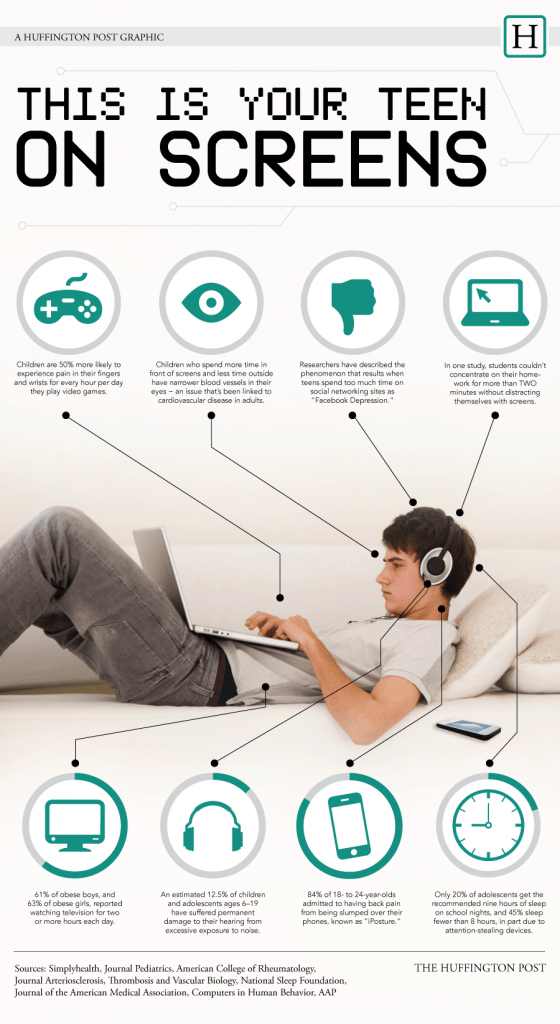Η Alissa Scheller created an amazing Infographic for Huffington Post.
It is estimated that children aged 8 to 18 spend an average of seven hours a day behind screens. Young people send around 417 texts messages every month. And 97% of teenagers have at least one electronic device in their bedrooms.
These numbers are scary enough when you consider how much time children spend on their screens, but it's even more scary if you consider the effects this behavior can have on health τους. Είναι αρκετά επώδυνη για την πλάτη και τους καρπούς τους. Διαταράσσεται ο ύπνος τους και μειώνονται η caution their.
It is almost impossible to cut off our children's access to technology anymore, since it has been so much in our lives, but maybe we could take some steps to help prevent negative mental and physical side effects.
Cracking over a screen
The physical position of the human body is an upright posture, and includes a small part of the lordosis (a curve inward) in the neck and also a part of the curvature (a curve) on the upper back. When someone is sitting in front of a computer, it's very likely that his shoulders are in the wrong position, like the head that leans forward. This attitude pushes the muscles and joints, causing pain and fatigue.
What to do: Dr. Sherilyn Driscoll, a physician of pediatric physical medicine and rehabilitation at the Mayo Clinic Children's Center, recommends to parents: The desk with the keyboard should be at arm's level, there should be a back support, and children should they must try to maintain an upright position.
Children move less
Η research έχει συνδέσει την παιδική παχυσαρκία με τον χρόνο που παιρνάει κάποιος μπροστά στην οθόνη του. Σε μια πρόσφατη μελέτη, ένα 61% παχύσαρκων αγοριών και ένα 63% παχύσαρκων κοριτσιών δήλωσαν ότι κάθονται μπροστά στην τηλεόραση για δύο ή περισσότερες ώρες κάθε μέρα. Οι μελέτες έχουν επίσης προτείνει ότι οι συνήθειες τηλεθέασης στην παιδική ηλικία μπορεί να προβλέψουν τον κίνδυνο παχυσαρκίας στην ενήλικη ζωή.
What to do: According to government guidelines, children and adolescents should have at least one hour of moderate to severe physical activity every day, at least three times a week, to increase their strength and develop strong muscles.
Fingers and fruits
Wrist and finger aches are common in children playing video games. A study (conducted by a child!) Found that children have 50% more likely to experience pain for every hour of gaming. Dr. Eric Ruderman, an associate professor at Northwestern University Feinberg Medical School, said video games may be harmful to the development of children's muscles and tendons.
Too many text messages can also cause pain and cramps on the fingers. According to a Nielsen 2012 survey, the average teen sends 3.417 texts per month, which is about seven per hour.
What to do: Ruderman says parents should limit the time of the game: Two hours a day is too much for an 7-or-8-time.
Their vision can be affected
Continuous use of electronics in a child's home and school plays a major role in the health of their eyes, according to David Epley, a pediatric ophthalmologist at Kirkland and a spokesperson for the American Academy of Ophthalmology. Every time a person spends time in front of a screen, the eye-opening of the eyes decreases, which can lead to dry eyes, itching and pains. While the damage it can cause over time is even myopia.
What to do: The American Academy of Ophthalmology recommends taking your eyes off the screen every 20 minutes and looking for about 20 seconds at least 20 meters away. "This will cause the eyes to open and close," said Epley. "This will restore moisture to the surface of the eye."
Their sleep is upset
According to a 2010 study from Pew, 4 from 5 teens sleep with their mobiles and near their bed. So even if they do not want to use their mobiles, they receive their notifications. Another study found that teenagers are sending 34 messages on average the night before going to bed.
The baby's sleep may be disturbed by the flashes of wake-up mobile phones, Huffington Post reports. Light can confuse the brain as our circadian pacemaker does not distinguish between the sun and a computer monitor. Lack of sleep has a psychological effect in childhood and adolescence, and can lead to irritability and poor social skills. Memory is also negatively affected, which in turn can reduce learning performance.
What to do: The National Sleep Foundation recommends that teenagers should have 9,25 sleeping hours each night (although for some children 8,5 hours are enough).
See Infographic Click to enlarge






